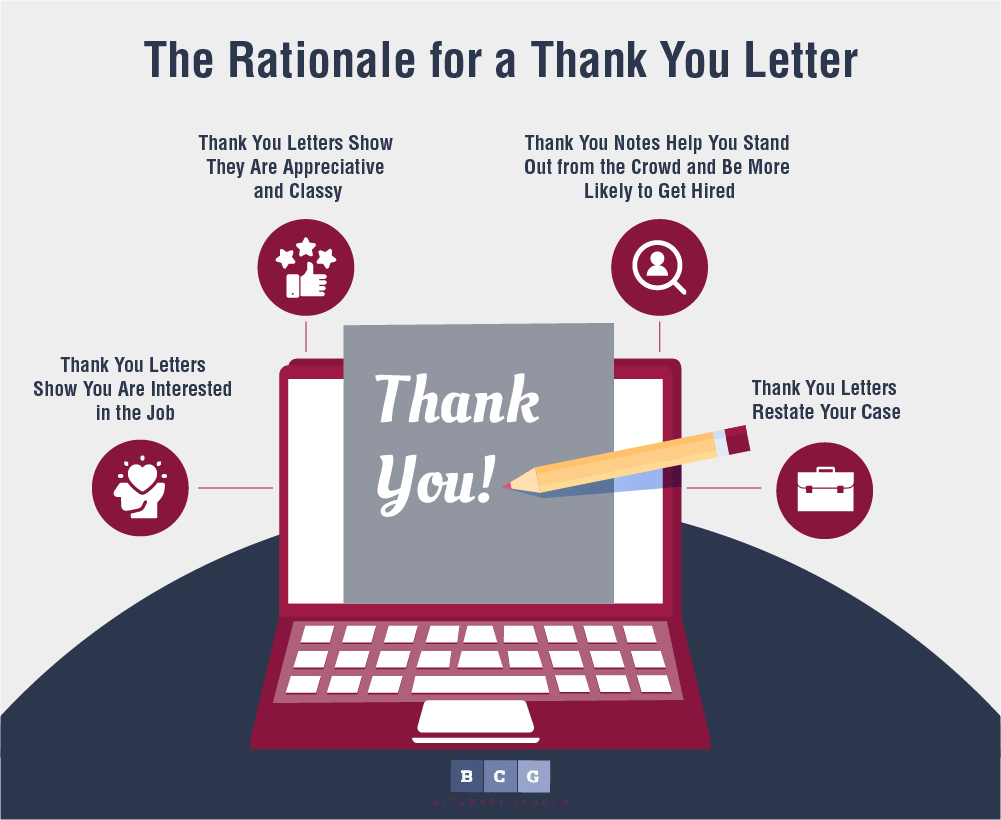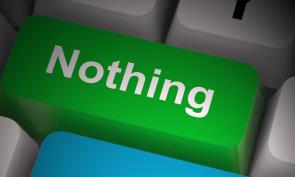
The longer I have been in the business of legal recruiting, the more I have become convinced that sending a thank you letter is a bad idea. I have heard—and seen far too many horror stories regarding thank you letters and believe the cost-benefit analysis strongly weighs against the writing of thank you letters. They are simply not a good idea.

|
| Harrison Barnes |
There is one thing you should always ask yourself when considering whether or not to send a thank you letter: what would you think if you got one of these after a first date? In the job search situation, you are trying out for a potential long-term relationship with your employer. Just as there is in dating, you need to have at least some mystery to make the other side like you and, in addition, the other side wants to feel like they are lucky if you are interested in them, too.
This article analyzes the benefits and the costs of writing thank you letters. I hope that after reading it, you too will conclude, as I have, that there are more cons to sending a thank you letter than there are pros to sending a thank you letter.

A. The Rationale for a Thank You Letter
Many attorneys think that thank you letter is a good idea, and that the pros outweigh the cons. The common reasons they think this are: (1) it shows they are interested in the job, (2) it shows they are appreciative and classy, (3) it helps them stand out from the crowd and be more likely to get hired, and (4) it restates your case.

Thank You Letters Show You Are Interested in the Job
If you go to an interview, are nice to your interviewers and shake hands with people after it's over, you are interested in the job. Moreover, if you apply to the firm in the first place, you are interested in the job. Think about it. The employer is already aware of your interest. If you really want the job, then let the employer know the reasons why during the interview. This is all you need to do.
Would you send a thank you letter after a good first or second date? If you got a thank you letter in the mail after a good first date, what would you think? You would probably think a couple of things.
First, you would think that you had already "closed the deal" and that the person was very interested in you. While this might seem like a good idea in some respects, it isn't. I am not suggesting you play "mind games" in either your personal or professional life, but I am suggesting that you do not need to completely "show your cards" to your potential employer.
If you show your cards too early, the potential employer will think that you may not have a lot of options. The employer wants to feel as if you are someone that is in demand in the market, because they will view you more favorably. To revisit the dating metaphor: people, in general, would not be excited to learn that no one else would even consider asking out their boyfriend or girlfriend if he or she were single. This is one of the cons of sending a thank you letter
Thank You Letters Show They Are Appreciative and Classy
Many attorneys got it drilled into them at some point in their lives (by their grandmothers, perhaps) that a classy person always writes a thank you letter to show their appreciation. I do not necessarily agree with this.
In romance novels, notes are always being exchanged between the knight and his damsel. In addition, many Americans have misguided views about how others higher on the socio-economic ladder than them behave. In this rarified environment (where a powerful partner you interviewed with might certainly live), it is imagined that thank you notes on expensive stationary are routinely exchanged after meetings.
Not necessarily the case. In fact, if a client got one of these notes, they would be more likely to think the attorney had ulterior motives rather than that they were classy or appreciative.
The fact of the matter is, you can express your appreciation at the end of the interviews by simply saying "thank you," smiling and genuinely conveying your feelings through the use of appropriate body language. Regarding the "class factor": you are who you are. You will come across as the person you are by the way you talk, the way you dress, the way you carry yourself and more. You are not going to change the employer's mind about your classiness through a thank you note.
Thank You Notes Help You Stand Out from the Crowd and Be More Likely to Get Hired
Many attorneys think that sending a thank you note will make them stand out from the crowd and therefore will be more likely to get hired. I will concede that this argument may have some validity if you are interviewing with an extremely small law firm. However, with large law firms, this is rarely going to make much of a difference.
Let me tell you how most interviews with large law firms work. I hate to be so simplistic, but in many respects this is how it goes:
b. Partner reviews your resume and decides whether or not you look good within 1-5 seconds;
c. You show up for the interview. Partner makes up mind about whether or not they like you by the way you look and what was in your resume within 1-5 seconds;
d. Partner interviews you for 15-60 minutes. May actually change their mind about whether they like you during the interview (10-15% of the time);
e. Partner fills out an evaluation of you in 1-5 minutes and sends back to recruiting coordinator;
f. Recruiting coordinator goes over your reviews from partners and associates who interviewed you and advises the hiring partner of them. Person is ultimately hired or not hired after some further discussion. This could take a day, or it could take months. Firm will be concerned with whether they have the money to hire you, the work to hire you, if your experience is right for the job, if your interviewers liked you, if you are likely to succeed in this position, your potential employment stability, your "fit" with the firm and more.
While I have gone about making this point in an extremely long-winded way, I hope you can see that there is little a thank you note can do to improve your chances in the above process. Yes, the interviewing process can be and is different for different firms and for different classes of attorneys (partners, associates, etc.). Nevertheless, the basic interview follows this sort of format. Here, the thank you letter is not all that likely to make that much of an impact on the process.
Now, in the interest of fairness, I would like to point out that there are certain types of situations where a thank you letter could really serve to make your point effectively but where I still would caution against writing one. The most common instance is when you are a very well-credentialed attorney coming from a large firm and interviewing with a smaller law firm. Here, there is a possibility that you would be well served writing a thank you letter and here's why:
When I was in law school, a small law firm from a small town in Alabama came to interview at my law school. There were many well-credentialed attorneys at this small law firm, but the fact remained that it was still a very small firm of less than ten attorneys. The firm only interviewed people who were on law review and had marketed itself as a rare lifestyle firm that was really exceptional. It got a lot of interest. For some reason, I wrote down the wrong time and showed up for the interview (being held in a small interviewing room on campus) about two hours early. Each interview was 20 minutes, so over the course of the next two hours I watched six separate law students in my class walk into their interviews with the firm. Based on the way the interview room was situated, I could also hear each interview occurring.
|
|
Each of the six people who went in for the interviews made the same pitch about how they did not want to practice in a big firm, money was not important, they were more concerned about a collegial atmosphere and more. It was amazing to me. I knew each of these students interviewing and they were among the most competitive people I knew. I also know each of them was full of it. Out of those six people, I know one of them went to work at Latham & Watkins (and is now a partner I think), one at Sullivan & Cromwell and another at Skadden Arps Slate Meagher & Flom.
The point here is that all these students were masterful bullshitters. Given what they did with their careers, it seems obvious to me almost all were lying to the firm. What I suspect is that if I had sat there the entire day, everyone would have said the same thing to this small firm. Certainly, the firm must have known that these people were not being honest. The only thing they were doing was trying to get the best job.
See also:
What this says to me is that there are certain rare situations when there are some pros to writing thank you notes that outweigh the cons. Here, every single one of these candidates was telling the same story. A note might have made their case a little better and made them sound more convincing in the end—if someone really did want to work in a small town in Alabama. Of all the potential situations where you would need to stand out from the crowd, though, this is about the only one I can think of where a note would help you do this. Given the small size of the firm, they would want a very intimate understanding of every candidate they hired. A note would also help separate those who are genuinely interested in the position from those who are not.
Notwithstanding, this sort of situation is so rare that I do not think it merits further discussion.
Thank You Letters Restate Your Case
While the above discussion touched on this a bit, I believe it is important to devote a separate section to "restating your case." Many attorneys who interview with law firms are under the impression that they need to (1) tell them what you are going to tell them in a cover letter, (2) tell them in an interview and (3) then tell them again in a subsequent thank you letter. If you have any familiarity with marketing, then you certainly may subscribe to this belief system as well.
I do not think you ever need to restate your case after the interview. If you have made your initial case well enough, you will not need to because you will already be believed by whomever is weighing the pros and cons of hiring you. If you restate your case, you may actually make things worse if there is any doubt or indecision with your reasons for wanting to work for the firm.
One of the most interesting classes I ever took in law school was a class in conjunction with the psychiatry department where we studied murderers. This class was fascinating because five other students and I actually got to watch police and psychiatrists interview murderers behind mirrored glass. One of the things that I learned in this class was that no matter how bad something is that someone does, they almost never think they are wrong or change their position. Throughout my legal career, as I worked for a judge, and then a string of attorneys, it became very clear to me that once someone has formed an opinion about something, it is exceedingly rare that his or her opinion will be changed. Certainly, outstanding lawyers can influence judges and juries. The truth remains, though, that most people believe what they believe and there is little you can do to change that. There are thousands of political, psychological and social situations where it is next to impossible to change what one party thinks.
In the interview situation, a thank you letter is rarely going to change how someone thinks about you. In fact, because people are more eager to justify their own decisions than anything, a thank you letter may actually serve the opposite purpose because the interviewer will read into it what he or she wants to in order to justify their decision.
If you did something wrong in an interview, if you did not make your case well enough, the odds are very slim that a thank you letter is going to make much of a difference. More than likely, it will hurt you.
In closing this section, I want to briefly write about a situation where I worked with a candidate and wrote a series of thank you letters with him over an 18-hour period that ended up getting him a job. This is a rare situation and one where I believe a considerable amount of skill was brought to bear. It was not easy, though, and it certainly could have backfired.
My candidate was working in a very distant place as a corporate attorney. While I will not divulge the location, suffice it to say it was not in the United States and he was working in one of the most isolated places I have ever heard about. He was practicing in an area where no one spoke English, where the weather conditions were brutal and where he desperately felt the need to return to the United States. The problem was, the market was not right for him to return at all. Without meeting him, I got him numerous interviews in the United States after convincing him to spend 30 hours and a great deal of money on train and airline fares to travel here. In his first trip to the United States, he did not get a single job offer and had very poor interview skills. For all intents and purposes, his job search appeared doomed.
The candidate continued to contact me and, feeling incredibly sorry for him, I continued plugging away at his job search, but was unable to get any results. The market was simply not right. As luck would have it, I was able to set up a meeting with a partner I knew who was traveling to this distant land for an unprecedented business trip. After considerable lobbying, I got the partner to meet with the candidate in a town about 3 hours from where he lived in a hotel bar for drinks. Incredibly, the partner agreed to bring him back to the United States in a few weeks for interviews.
I prepped the attorney the best I could for the interviews, but they still did not go well. I learned this from someone else inside the firm on a Friday evening. My candidate was scheduled to get on a flight on a Sunday morning for his 30+ hour trip back. I called my candidate on Saturday morning at 7:00 am and told him to come over to the office so we could reposition his candidacy with the firm.
With considerable coaching, he did not complete his thank you letter until about 3:00 am that morning. It was an incredible effort. The letter went into detail about why he wanted the job, was brutally honest about his lack of opportunities, described how hard he would work and how much the position would mean to him and ended up being a very moving product. I actually heard that a couple of partners who received the letter cried when they read it.
He got the job.
This situation, however, was extraordinary. There are not a lot of situations like this where you need to step in and really do something monumental to get a position. It worked here. It would not always work and it was a risk. I want to be clear with you that this sort of tactic should only be used in the rarest of situations.
B. Why You Should Not Write Thank You Letters
You should not write thank you letters because, (1) they make you appear not to have any other options, (2) they give you an opportunity to screw up, (3) they can potentially polarize interviewers against you, (4) they can make you appear dishonest or disingenuous, and (5) they make you appear like you have nothing better to do.
Thank You Letters Make You Appear Not to Have Any Other Options
Let me be frank about one thing: Most attorneys do not write thank you letters after an interview. In fact, I would say that less than 5% do. Accordingly, the people who will receive your thank you letter likely never wrote one themselves when they got a job at the firm. Therefore, their first questions are: Why is this person writing me a thank you letter? Is his current job in jeopardy? Is he desperate for a job?
As a legal recruiter, I have worked with numerous attorneys throughout the years. I have worked with attorneys whose firms were shutting down, attorneys who are unemployed and attorneys who were eager to find a new position for various reasons. The attorneys who typically ask me whether or not they should write a thank you letter are usually in trouble or desperate for a change like those above. I hate to be so brutally honest, but this is true.
If an attorney is considering writing a thank you letter, they have put themselves in a situation where they are effectively saying: "I really need this job, I want to give myself every possible advantage and a good thank you letter may really set me over the top." This is not the best strategy.
If you appear not to have any other options, the firm is likely to think there is something wrong with you that they do not know about. Firms want to feel like all of their attorneys are strong and in demand. If you do not appear in demand, firms will think that you are interviewing there because they are losers. Firms do not want to feel like losers.
There is also no way to make firms think you are in demand in a letter that is likely to be effective. Lawyers are suspicious by nature and are likely to think you are "bluffing" anyway if you try and make this case in a letter. It is also likely to piss them off. Keep the mystery going by not writing a thank you letter.
Thank You Letters Give You the Opportunity to Screw Up
I have heard so many thank you letter horror stories that it is hard to count. When you write a thank you letter, the chances are very good you may make an error. They happen all the time. One of the most common errors is a typo, a misspelling, or something of the sort. You may get the firm's suite number wrong, you may misspell a name-the list is endless. One of the more common ones I have heard, is attorneys interviewing with several firms and sending thank you letters and mixing up the people at different firms. This is more common than you might think. All of these errors are so common, I would estimate they happen with over 50% of the thank you letters attorneys write after an interview.
Regardless of your good intentions, these errors can be extremely fatal. They communicate a lack of detail in an extremely important piece of written work product designed to get you a job. They give those who interviewed you and were unsure or simply did not like you excellent ammunition to use against you to prevent you from getting a job. No matter how hard you try, you may end up making errors in these letters. I do not care if you were Summa Cum Laude from a top five law school and work at a top ten American law firm - to err is human.
Have you ever looked at someone's handwriting and decided that you did not like them because it was too sloppy, not sloppy enough, too organized, too pronounced, too formal-whatever? The fact is, many people read others writing and will reach conclusions simply by the way it looks. I'm not kidding! Why on earth would you want to give someone an opportunity to dislike you based on this?
In addition, we have not even spoken about the quality of the stationary you are using. Is it too expensive, not expensive enough, too colorful, too bland, too large, too small, too formal, too personalized, not personalized enough-whatever? Again, the quality of the stationary you are using says a lot about you. Maybe the person receiving it will like you based on this-maybe they will not. You simply have no way of knowing. Why, though, should you even take a chance?
I have also seen many stellar attorneys who were guilty of (1) faxing thank you letters from work, or (2) sending a thank you letter from their work email address. These are stylistic things that can also cost you an offer-regardless of how good of an interviewee you are. Not worth the risk.
All of the concerns above are stylistic. Certainly, you can screw yourself up based on style, but what about substance?
In your thank you letter, you may say something like the following:
As a patent attorney, I really feel Smith Smith & Smith fits in with my goals.
I particularly look forward to the opportunity to start getting some litigation experience in addition to doing patent prosecution at your firm.
What if the firm does not have much IP litigation and only prosecution? You may have just blown yourself out of the water. Despite their representations in the interview, you have no idea what the firm's plans are for you. You could say 10,000 different things like this in a thank you letter and end up not getting a job due to it, unbeknownst to you.
The point of this is that you never know how the firm is going to view either the stylistic or the substantive representations you make in your thank you letter. Be extremely careful before you write a thank you letter and know that it will have consequences you might not ever be able to foresee.
Thank You Letters Can Potentially Polarize Interviews Against You
The fact of the matter is, some interviewers are going to be more interesting to you than others. Consequently, you will make more of a connection with certain interviewers. While this is perfectly normal, the fact that you might have more of a connection with one person than the other is not something that is going to serve you all that well in the interview stage.
When you write your interviewers thank you letters, there is a chance that some may compare letters. If one letter is long and shows an obvious connection and another does not, one interviewer may decide they do not like you due to this. Does this sound crazy? Yes. The dynamics of social organizations can be nothing short of insane. You simply cannot understand them-especially when you are not working there.
Do not make the dynamics of a certain firm work against you. This is almost unavoidable if you are sending several thank you letters. Many interviewees decide based on this logic just to write one thank you letter-to the highest ranking partner they interviewed with, for example.
Again, this can backfire. "He only respects the most powerful person he interviewed with?" one interviewer might think. That person will not even be giving him assignments-I will.
I hope you can understand that there is just potentially too much going on here with thank you letters for you to get involved. They can turn your interviewers against you. Avoid them.
Thank You Letters Can Make You Appear Dishonest or Disingenuous
Thank you letters are typically rife with statements that sound suspect. Interviewees will say things like "it was the most interesting conversation I have had in a long while," or "our discussion reaffirmed my belief that this is where I really want to work." When an interviewer gets a letter like this, he is often surprised because you have may have only touched briefly upon what you are referring to. Accordingly, what you write will sound dishonest.
The main issue with thank you letters is that it is often difficult to say anything without appearing to be stretching the truth. The intent of most attorneys in writing them is to say something-anything-in order to make a positive impression and stick out. This is often impossible to do without appearing to be pushing it a little bit.
If you appear to be a little bit overreaching in your thank you letter, the interviewer may think that you may not be trustworthy. You may remind them of opposing counsel, an ex wife-or more. You need to be extremely careful.
Given this concern, many attorneys try and be understated in their thank you letters. The problem with this is that they then sound disinterested in the position-or even sarcastic. You can never control how others view what you write.
Thank You Letters Make You Appear Like You Have Nothing Better to Do
Good attorneys are always busy. Clients and other attorneys in the firm always want to give them work because they know the work done by the good attorney is of the highest quality. Those are also the sorts of attorneys most firms want to hire.
When you sit down to pen a thank you note, many attorneys who receive it will not help but think that you have nothing better to do. This is extremely unattractive to many interviewers. Worse, you may fax them the thank you letter from work on the firm stationary, or send it using the firm postage meter. This looks bad. Really bad.
You want your interviewers to think you have a lot going on-so much so that you do not have time to write a thank you letter. You do not need to make all interviewers think this, but you need to make some of them think it.
Conclusions
Getting a job, interviewing for a job and then getting an offer is a careful dance. This is especially so with law firms. If you screw up at any stage in the process, you may lose your opportunity for an offer.
Ultimately, it is up to you whether or not you write thank you letters. In extreme cases, as I have pointed out in this article, I think they can work. In the vast majority of cases, though, I do not think they are worth it. When you write a thank you letter you are taking a major risk you do not have to.
If not a thank you letter, then what?
- See Interviewing Tips for more information
All you have to do is shine in your interviews and make the best impression possible. Do this and nothing more and you will never have the need for a thank you letter.





